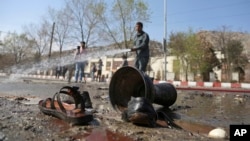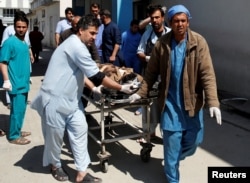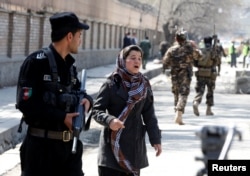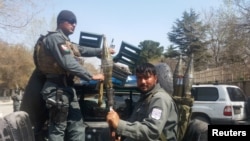Afghan officials say a suicide blast has killed at least 31 people and wounded more than 65 others in Kabul.
Officials and witnesses say the bomber targeted a crowd during celebrations to mark the Persian new year, Nowruz, Wednesday near a Shi'ite Muslim neighborhood.
Islamic State claimed responsibility, according to the SITE Intelligence Group that monitors global jihadist threats. The terrorist group identified the bomber as a Pakistani man, saying he detonated his suicide vest amidst the gathering in the Kart-e-Sakhi area.
An Afghan Interior Ministry spokesman, Nasrat Rahimi, told VOA those killed and wounded were all civilians.
Police and rescue workers say the death toll could rise.
President Ashraf Ghani condemned the terrorist attack as "a crime against humanity," saying such acts will not deter Afghans from celebrating their national and religious events and undertaking developmental activities.
General John Nicholson, who commands U.S. and NATO's Resolute Support mission in the country, denounced the attack.
"The latest attack by the enemies of the people of Afghanistan once again shows their savagery and inhumanity.It was an indiscriminate attack on innocent civilians," Nicholson said.
In recent months, IS terrorists have frequently targeted Shi'ite places of worship and gatherings in the capital city and elsewhere in Afghanistan.
The most recent IS-plotted attack took place March 9 when a suicide bomber struck a Shi'ite mosque, killing 10 people.
Afghan authorities have lately tightened security across the city and intelligence officials have claimed to have arrested IS operatives and uncovered the group's cells.
Despite the success, the government is under fire for not preventing insurgents and terrorists from carrying out deadly attacks in Kabul.
General Nicholson disclosed last week that Afghan forces have launched a campaign to clear militant "safe houses" and "facilitation networks" from sections of Kabul.
He said intelligence-driven raids as well as "house-to-house" searches in about 18 districts inside the city are ongoing. The general added Afghan intelligence operatives, together with U.S. special forces, have successfully identified and taken out a number of militant-linked locations.
Nicholson, however, acknowledged the security campaign faces "a big challenge" in a city of more than five million people that has grown in a "very haphazard" way during the past 10 years. He also noted a large amount of criminal activity in the city.
"Often we find criminal networks that helped enable the activities of terrorists," he said, adding, "So, we are dealing with a pretty significant problem inside the city to clean it up."







